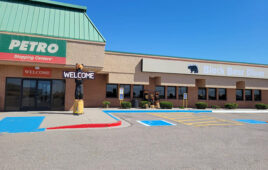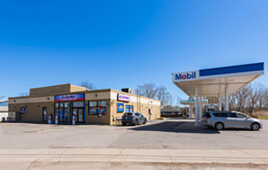Stop-N-Go Stores has been a convenience beacon in Medina, ohio foralmost half a century, but the 10-store chain has become a force to be reckoned with ever since Becky Shotwell took over theoperation from her parents, Ruth and Carl Abell,who founded the company in 1963. Shotwell hasacquired a depth of knowledge and experiencethat few operators receive. Her ability to evolvethe company to meet the changing needs of theconsumer and to avoid the ever-changing pitfallsof the industry made her an ideal choice to chairthe National Convenience Store Advisory Group(2002—2003). Today, Shotwell’s approach continues to center on a back-to-basics strategy witha strong commitment to innovation. This commitment has driven the success of Stop-N-Go Stores,but the most apparent distinction of this finely runstore is Shotwell’s dedication to a personal management approach. Her personal touch has driventhe business on all fronts, from employee care toaffording excellent customer
service.
CSD: How do you define excellence for yourstores?
Shotwell: By the number of repeat customers we get. The biggest focus for us is todrive repeat business. We do this by offering outstanding customer service, cleanstores and giving customers what they want.We continually work on customer interaction and how we treat our customers. Itsounds like a “no-brainer,” but you can getso focused on the operations side of thebusiness that the customer becomes secondary. For us, the customer is our primaryconcern and if that ever changes, then wemight as well close up shop.
CSD: What separates Stop-N-Go Stores fromthe competition?
Shotwell: We have looked at our competitors, that are mostly large chains, and we’veasked, “How can we distinguish ourselveswhen we compete with large, beautifulstores?” We believe our edge comes frombeing personal—something at which largechains aren’t as effective. We are out therein our stores, face-to-face with our customers. As a result, we have more intimaterelationships with them. We are also localand we know the needs of our community. That is a big deal that gives us a greatadvantage.
CSD: How have you worked to control laborexpenses?
Shotwell: This is an on-going challenge forus that has a cause and effect. If you cuthours then the people are more tasked atthe store, and yet they still need to offer thelevel of customer service we expect. Thiscan be a difficult obstacle to overcome. Wework on minimizing the labor cost impactas much as possible, but we also need tomaintain the level of quality customer service at each store.
CSD:As a past National Convenience StoreAdvisory Group (NCSAG) chair (2002—2003), what insight did you obtain and howare you applying that to your stores today?
Shotwell: NCSAG gave me my college education in this industry. I could go to the eventsand see what was happening in the industry, and it was a convention I would nevermiss. Every time I left a NCSAG convention, I came back with ideas that I could apply tomy business. I could speak with people inCalifornia and learn about the regulationsand trends that would eventually make it toOhio. I developed strong bonds with manypeople from the organization, and I still relyon those contacts that I made years ago.I continue to apply what I learned throughthis organization today.
CSD:What categories or products do youthink will surpass sales expectations in2007?
Shotwell: We continue to look to our foodservice offerings as an area that hastremendous growth potential. We are in theprocess of hiring a foodservice operationsspecialist to ensure that we are innovativein this regard. In addition, we are openingour second car wash. We anticipate thatthe car wash facilities will aid in our ability to generate new revenue opportunities.Our soft drinks have just been reset andwe have incorporated new energy drinks aswell as new teas. The beverage category isbecoming a bigger focus for us as we moveforward.
CSD:What do you want customers to thinkwhen they enter your stores?
Shotwell: I’d like them to think that we offera higher level of customer service. I alsohope they think the quality of food we offeris not what they might expect from a convenience store. I often think of Nordstrom orthe Ritz Carlton and their outstanding levelof customer service. I ask myself, “Whycan’t we do the same at our stores?” I feelwe can strive to make our stores a pleasurefor our customers through excellent customer service.
CSD:Stop-N-Go operates a proprietary foodservice program called The Market Place.Describe your foodservice program and whyit’s important to your business?
Shotwell: Foodservice is a big growth opportunity for us. Look at all the categories andsee the various restrictions, then ask yourself, “Which segment do we still have theflexibility to do what our customers want?”We know our customers want good food andone location where they can get it all. Ourfoodservice offering focuses on high-qualityfood with an emphasis on fresh and uniqueproducts. We have grown our emphasis onhealthier foods, but we will also continue toserve traditional c-store offerings.
CSD:What area of your operation are youlooking to improve or modify in the futureand why?
Shotwell: We updated our logo recentlyand since then we have remodeled severalstores. We will continue to remodel locations as we grow. We are always analyzingwhere we are, and where we need to go. Thelook of our stores is critical to our growthplans moving forward.
CSD:How does your team determine whento replace a slow-selling or low-interest product with a stronger selling item?
Shotwell: Rich Frank, our general manager, is extremely knowledgeable about theindustry and trends. It is imperative thatyou have someone with strong knowledgein your organization to know when and howto employ your exit strategy.
CSD:What are some of the biggest challenges facing small operators in theconvenience channel today?
Shotwell: Adhering to government regulations is the biggest challenge for our stores.The numerous regulatory changes makeoperating a small store extremely challenging. The changes that occurred just from2005 to 2007, and what we have as a resultwas mind-blowing. We stay ahead by reallydoing our homework. The cost to operate a store is higher than it used to be and yousimply can’t afford to operate a marginalstore anymore.
In addition, health insurance is a bigchallenge as well. It is difficult to find quality health insurance that is affordable, and Ithink all small operators struggle with this.
CSD:What recent or past decision had thelargest impact on the profitability of youroperation?
Shotwell: The minimum wage increase thatoccurred in January certainly had an impacton our profitability. The smoking ban in Ohiocould have some impact as well, but it willbe interesting to see how that pans out. Asa result, we need to be more innovative inother areas to increase our profitability.
CSD:What employee initiatives or benefitsbring you the most satisfaction?
Shotwell: Every year we implement ourSummer Blitz program, which offers recognition for employees that receive high-rankingscores for cleanliness (Mr. Clean program),summer sales programs, top store operations, best foodservice preparations, aswell as other criteria. Judges determinethe winners, who have an opportunity toearn recognition, cash prize
s and company dollars for an employee auction. It’san outstanding program that really engagesour employees and rewards them for theirefforts.
We utilize a personal approach withour employees. Recognizing and rewardingthem through various programs as well asweekly newsletters and personal birthdayand anniversary cards may seem like littlethings, but they have an enormous impacton the satisfaction of our employees.
CSD:Why is community involvement soimportant to Stop-N-Go?
Shotwell: We are particularly proud of ourcommunity efforts, which include programswith local schools, the Rotary, our local firedepartments, YWCA and several festivals.Moreover, I’m involved with the local hospital, the Chamber of Commerce and othercharities.
We are part of the community, and weare happy to be involved. We want to beknown for being personal, local and part ofthe community. For us, it’s about community; it’s about being in touch and being “apeople” organization.




